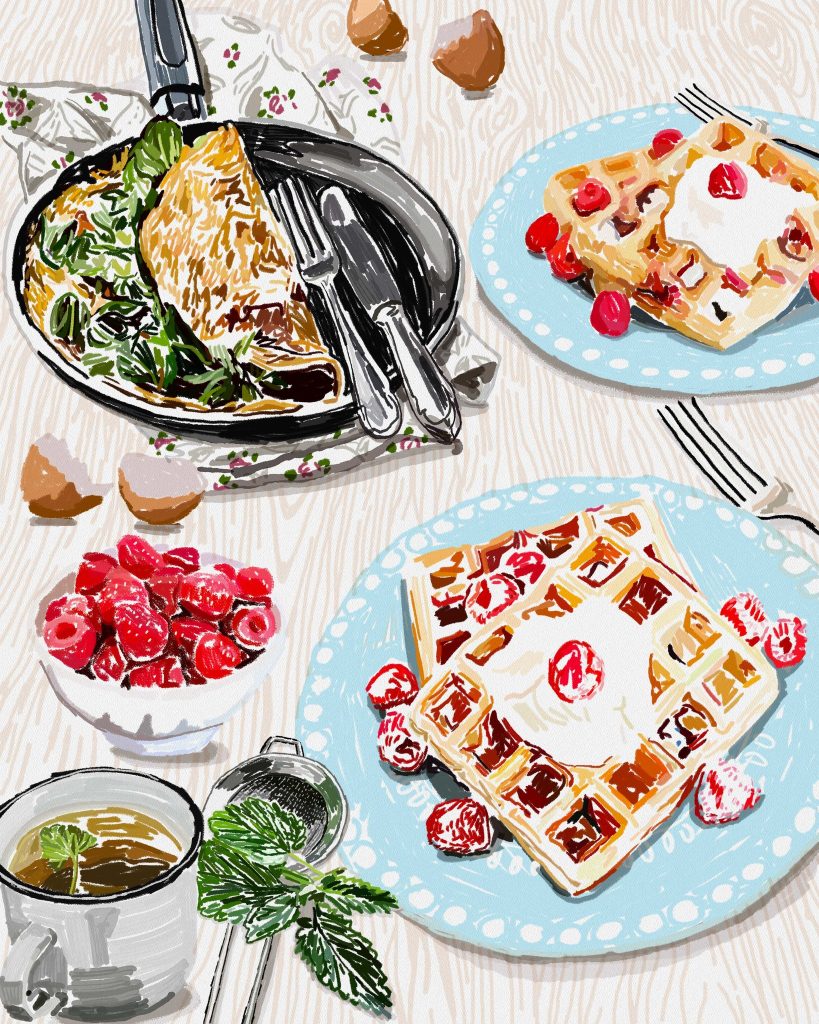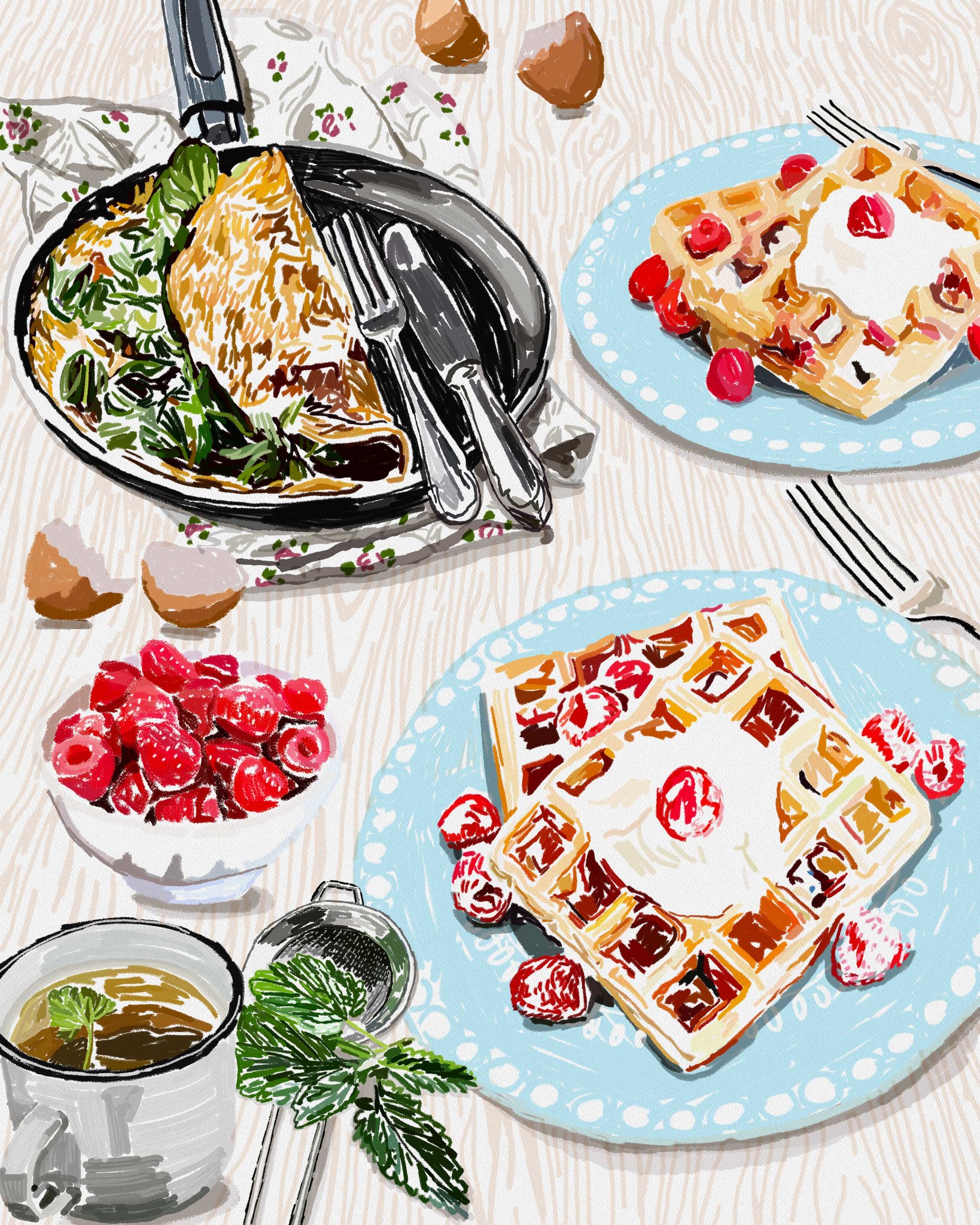EVEN WITHOUT A HOME, WE ALWAYS HAD A FAMILY MEAL
Misha Collins

Actor Misha Collins remembers a nomadic childhood grounded only by his mother’s cooking.
If you’d met me at a party 10 years ago, I would have told you that my childhood had just been one great adventure after another. When my family lived in a tent in the woods, we used an old galvanized tub filled with cool water as our refrigerator. We fashioned pantry shelves from corrugated sheet metal lashed to two young maple trees, and my mother developed a method for making her signature mushroom frittata in the coals of our campfire.
Times were often lean, but one luxury we always had in abundance was food — even if it came by way of a five-finger discount. My mother taught me how to steal peaches from the Stop & Shop grocery store when I was 4. (The secret, in case you’re wondering, is to look relaxed, not guilty.) Our backpacks heavy with purloined groceries, we’d distract the cashier by casually buying a few inexpensive items with food stamps — a loaf of bread and maybe a carton of milk. We were stealing from “the man”; it was a justified rebellion against an unjust system.

We’d make our escape in a battered black Chevy Nova. When reverse stopped working, my mother started parking on hills so gravity could pull us out again. Then we lost third gear, then first, and finally we abandoned the car in a ditch on the side of a rutted dirt road. After that we hiked through the forest to the school bus and rode our bikes down to the river with a bar of soap to take our baths. When we needed to go the distance, we’d hitch a ride.
Mom took me, my brother and our dog hitchhiking from Boston to Seattle the summer I turned 6. We rode high up in the cabs of 18-wheelers and slept in a sun-bleached canvas tent in Midwestern wheat fields. We saw black bear and bighorn sheep and Big Rock Candy Mountain.
Instead of passing the time with Play-Doh and papier-mâché crafting like other families, we made cardboard signs that read “No Nukes” and carried them proudly at marches all along the East Coast from Washington, D.C., to Seabrook, N.H.; along the way, we learned about the Cold War and civil rights and chanted, “Power to the people!”
We hopped into slow-moving, empty boxcars on freight trains and scored hot meals at soup kitchens. Occasionally, on our journeys, the kindness of strangers would bring unexpected bounty. I remember being awestruck at our good fortune once when a lady in a pickup stopped at our tent on the side of a road to give us a $14 gift certificate to Abdow’s Big Boy. We feasted.

“We’re gypsies,” my mom would whisper — as if our constant migration was part of a long heritage, full of mystique and magic. I went to a different school every year, sometimes two schools in a year, but class was always optional, and I skipped school often for “mama-and-Misha days” to play pirates or make pickles or pick Concord grapes for jam. When we didn’t have a home, we called it “camping out” — we didn’t think of ourselves as homeless.
My upbringing taught me that you didn’t need money to be happy, that you didn’t have to play by the rules and that the whole world was just begging to be explored. But now, from the hindsight of fatherhood (and from the comfort of a therapist’s couch), I see that while my childhood had been rife with adventure, it had also been lonely and frightening and wanting.
When I became a parent myself, I started to recognize the hidden costs of the adventures in my early years: I had grown up surrounded by danger. At 9 and 7, my kids still find most Pixar movies too scary, but when I was 10, I was getting sunburnt working on a cucumber farm and was haunted with recurring nightmares about nuclear holocaust after watching apocalyptic movies at the art-house theater with my mom. A trucker once propositioned my mother for sex — and left us standing in the rain on the shoulder of the highway when she refused. I notice I’m reluctant to tell these pieces of the story that might tarnish the rosy picture of the past that my mother has painted.

Mom didn’t have money for babysitters, and sometimes when I was as young as 6, I was left alone to watch my little brother. We survived, but in truth, 6-year-olds make pretty terrible babysitters. I once sent my own 6-year-old downstairs alone so I could get another half-hour of sleep, but I was soon awoken by a high-pitched scream. My daughter, set on making me breakfast in bed, had coated the kitchen floor with olive oil so that she could rollerblade more swiftly while making waffles. It did not end well.
My kids are living a distinctly different childhood from my own. They’ve had the same friends since preschool, a posse that moves together sure-footedly through lost teeth and first crushes and learning how to read and ride their bikes. My family had moved 15 times by the time I was in high school. We changed towns so often that I more or less stopped making friends for fear of losing them, and I never really grew to know any place to be a home. I was too ashamed to bring schoolmates home — at 10, I would never have considered letting the other fifth graders into the strange-smelling, windowless, shower-less room that we sheltered in that winter.
But, even when we were squatting in an office space or hitching across the country, my mother managed to create a sense of home around meals. Whether she was cooking chicken soup on an electric hot plate or we were sitting on a log eating eggplant parmesan prepared on a campfire, Mom fed us with thoughtful attention. She showed her love daily through the food she cooked. Dinner was our anchor — consistent and soothing, it knit the three of us together, it made our little world feel safe.

I recently found an old journal in a box in the back of my closet. And on the page from a decade ago where I had taken inventory of the good and bad of my upbringing, the word “cooking” is circled and underlined with urgency in the “+” column as if I was thinking that food had been the cornerstone of happiness in my youth.
My children came at a time when my acting career took center stage. I was traveling almost weekly, working almost constantly. Swept up in the whirlwind of just-discovered celebrity, I was often gone, and when I was home I was sometimes only there in body, with my mind elsewhere. Needless to say, family meals took fourth fiddle, and my wife and I fell into a pattern of convenience. We fed the kids what we thought they’d eat (the greatest hits of bland and beige) and then fed ourselves after they finally went to sleep.
One morning, just home from 10 days of publicity travel in Europe, I was up at 4 a.m., jet-lagged, and a cold kept my daughter, Maison, awake, too. We were downstairs together when she stopped sorting her rock collection to interrupt my iPhone-addled trance. “Dad, you’re away so much that sometimes it feels like I just have one parent,” she said. Hearing her say that, I felt like I was failing at fatherhood — I wondered if I had become an incarnation of my own often-absent dad.
I wanted to tell my youngest child that there was no place I’d rather be than with her, that I was here and that I always would be. But instead of saying those words, I set down my phone and I told her I loved her in the clearest way that I know how. “Maison,” I said, “if you could have any breakfast this morning, what would it be?” And before sunrise we had finished a feast of cheese and spinach omelets and raspberry waffles with whipped cream and peppermint tea.




